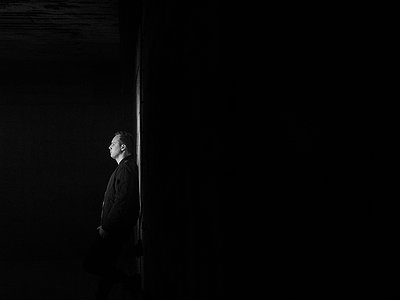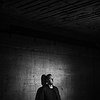Name: Stephan Hinz
Nationality: German
Occupation: Producer
Recommendations: Francis Bacon - Study after Velázquez's Portrait of Pope Innocent X
Website / Contact: If you enjoyed this interview with Stephan Hinz, his website and facebook profile offer plenty more information.
When did you start playing your instrument, and what or who were your early passions or influences? What what is about music and/or sound that drew you to it?
I learnt several instruments over the years. I started with the flute in school, followed by saxophone (I sucked) and then 12 years ago I started to learn the piano. But I would define the meaning of instrument a bit wider because my live setup is also my instrument and also my studio setup. It actually is a meta-instrument like the orchestra for a composer. You have to learn and understand every single aspect of it, you have to rehearse all the time and you need years of training to become good at it. You play the piano? Nice, but this means nothing if you want to "play" the orchestra to use the same metaphor. You don’t need to be able to play the violin in the end, but you need to understand how it’s played and what are the possibilities to write something meaningful or even executable for it. The same goes for my live setup. I’m a one-man-band when I’m playing …I play the keys, the bass, the drums, I mix, I arrange and so much more … I even somehow DJ because I need to read the room, the vibe of the people and based on this I decide what track to play next and in which form. It’s a very complex beast. I love complex things.
For most artists, originality is first preceded by a phase of learning and, often, emulating others. What was this like for you? How would you describe your own development as an artist and the transition towards your own voice? What is the the relationship between copying, learning and your own creativity?
Same here … I started with electronic music because I realised I wanted to write my own music, I wasn’t a good enough instrumentalist to play in a band so the only chance I had was becoming a composer and producer and work with a computer. Since I love electronic music it was just natural to go into that direction. When you have no idea how things are working, you have to learn and emulate others to understand how they did it. I think that applies to every art because you need to find out what you like and what you don’t like and how to come up with the things you like. That part is simple handcraft that combined with your artistic decisions hopefully end up in something original. Copying and emulating is an important step to this goal because you learn a lot from it … but mostly just in terms of craftsmanship. In terms of originality, for finding your own voice you need to learn how to follow your intuition and trust your instincts. If those are strong enough you’ll end up with your own thing. Both originality and craftsmanship just come with a lot of practicing, spending every spare minute playing, producing or whatever the art is you want to do.
What were some of your main artistic challenges when starting out as an artist and in which way have they changed over the years?
Everything was a challenge and it still is but the challenges have changed. In the beginning I was like a blind guy walking around in a labyrinth. I started at a time where there was no Internet. So no tutorials on how to use a sequencer, on making music in general, on how to program a beat, using a synth or whatever. Nothing. The only chance I had was listening to others and then fiddling around until it was somehow like the reference. It never was like it but this process helped me to find out how those things worked and at the same time it was a great step into finding my own voice. I wasn’t good enough to emulate other people's music properly so I had to live with what I was able to come up with. That was frustrating back then, today I’m very grateful for that because I had to accept my own voice otherwise I would have quit. Today the Internet is full of thousands of forum threads about how Tale Of Us are doing their basslines or how this or that artist is programming beats and with what gear. That’s amazing but there’s also a danger that you’re not really developing your own voice because there’s no need to because you can sound like your hero very quickly. And even though we all start like wanting to sound like the music of our heroes, it’s the death of all originality and super-boring. The world doesn’t need another Hans Zimmer or another Sam Paganini but maybe the world really needs a new fill in your name here.
Tell me about your instrument, please. How would you describe the relationship with it? What are its most important qualities and how do they influence the musical results – and possibly even your own performance?
The piano is the king of all instruments for me. You can make everything with it. Really, everything. And almost everything I do starts at the piano or I check it at some point on the piano because it really helps to abstract things. My other main instrument besides the studio is my live setup. The core is Ableton Live running audio samples of my music, NI FM8, Massive, Maschine, Kontakt, U-He Bazille & Repro. Then there’s a keyboard, NI Maschine & F1, DJ Techtools Midi Twister and an Akai APC40 to control everything. While the piano is influencing my music a lot, my live setup is more like a toolkit to present my music than to develop it. It needs to work all the time and that means that you have to break things down to plugins and components you know super-well and which you can rely on. Of course, it also influences my writing somehow and I use all the things I have with me freely when I play but the situation is different and I try to keep writing and performing separated. In a club or festival environment the music is just one sensation out of a handful. You have the lights, the people, the hhhhuuugggeee sound systems, the location and all those things keep you so busy that a good kick and a HH go a long way. Sure, you need all the other musical elements as well, but in that situation less is more. But if you transfer this to your writing process the tracks are getting too effective and you loose that element that your music needs when people are listening to it outside the club or festival.
Derek Bailey defined improvising as the search for material which is endlessly transformable. Regardless of whether or not you agree with his perspective, what kind of materials have turned to be particularly transformable and stimulating for you?
Well, I’m not an improv artist … beats me. For me personally, I’m not looking for material that is endlessly transformable, at least in the sense how I understand his quote at this very moment. I’m always on the look for new things … not necessarily new things in music, but new things to me. I’m easily bored by things I already did and I always need to find new perspectives on my music. Finding new grounds, fields I haven’t discovered before always interested me most.
How is playing live in front of an audience and in the studio connected? What do you achieve and draw from each experience personally? How do you see the relationship between improvisation and composition in this regard?
For me playing live and going to the studio is not as closely connected as you might think because when I play live it’s more about bringing my idea about music to life than about getting inspired. Actually it’s about interpreting my music. Of course, it is also very creative and needs inspiration but not in terms of creating all new content, more in terms of working creatively with the things I already created at an earlier point.
I gain a lot of energy from my gigs but it’s not like I go to the studio after a gig with a lot of new very specific ideas in my head. It’s more about the vibe and how people reacted to my music and about those moments when we were in sync.
Same goes when it comes to the relationship between improvisation and composition. They’re two different things to me, of course connected but different. I love improv and use it as a tool for me to kick things off, but composition is more. It’s about the intellectual, the artistic involvement in creating something that lives longer than just for the moment you’re improvising in. A real improvisation can’t be repeated otherwise it’s not an improvisation. Even though I like the idea, that’s not what I’m after.



